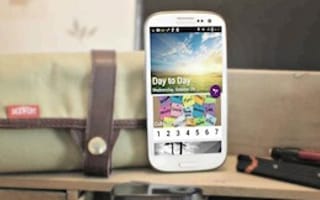
Earlier this month, researchers at Northwestern University’s Center for Behavioral Intervention Technologies unveiled the initial results from a field trial that used smartphone apps to help people struggling with anxiety and depression.
Ken Weingardt, the center’s scientific director, said the outcomes seen in the study are comparable to those of people receiving in-person therapy.
“Roughly half of [the participants] went from being symptomatic, in terms of their anxiety and depression, to being asymptomatic, meaning that they really recovered from their depression from engaging with these tools over an eight-week protocol,” said Weingardt. “We were surprised that the effect was so large, so we went back to look at the data a few times to make sure that we were right.”
The IntelliCare suite consists of 12 individual apps, each of which is designed to help patients employ one specific research-supported strategy or technique to overcome their symptoms.
The IntelliCare Thought Challenger app, for instance, is designed for people who struggle with negative thoughts. It encourages the user to write down their negative thoughts, re-frame them in a more positive way, and consider what caused them to have the negative thought in the first place.
Other app strategies include tracking what makes you happier in order to do those things more often, learning meditative practices and working to put anxieties in perspective.

Weingardt said each app is designed to be simple to use, requiring a low level of commitment for users. That desire for simplicity, Weingardt said, was a driving factor in creating a suite of small apps, rather than one comprehensive program.
“The idea is really that people have these apps in their pockets, they can pick which ones they find helpful, and they can use those as they need to in their daily lives,” said Weingardt.
Each app also communicates with the IntelliCare Hub app, which puts the data from all the others in one place. Over time, the Hub app will also recommend new apps to try out, based on how the user responds to apps they already use.
The 99 participants in the eight-week Northwestern field trial were encouraged to choose one or two apps from the IntelliCare suite to focus on per week and received follow-up from a team of coaches. These coaches helped users get started with the apps through an initial 30- to 45-minute phone call, followed up with users via text message once or twice a week, and checked in with a 10-minute phone call midway through the study.
Weingardt said the coach follow-up, intended to help participants complete the whole program, was important. But even if the results depend on some degree of human touch, app-assisted treatment would prove a cost-effective and convenient alternative to in-person treatment.
However, Weingardt emphasized that apps won’t be an answer for anyone.
“This isn’t a tool to help you if you’re in an acute crisis," said said Weingardt. "It’s more about skills and strategies to make your life more enjoyable and more engaging on a day-to-day basis.”
Although the results of the initial field trial look promising, the findings are far from conclusive. The center is currently recruiting patients for a 350-person randomized trial to see if its results can be replicated. Weingardt expects that trial to be completed in the spring or summer of 2017.
Weingardt said the team decided to take on anxiety and depression because those conditions are ubiquitous yet largely underrecognized, and because many people who are diagnosed still don’t end up receiving the help they need. At the same time, living with depression takes a toll on a person’s overall health, effectively driving up healthcare costs across the country. This creates a strong incentive for healthcare systems to consider new approaches — and to intervene earlier.
Weingardt said the approach may have potential in the treatment of other conditions as well.
“For folks who are in recovery from a substance use disorder, they are often depressed and anxious, so many of the apps in the suite could be of help to them. But we are considering building another app that would specifically target preventing relapse to substance use,” he said. “We’ve had some discussions about potentially extending it to include some post-traumatic stress content as well, to help people deal with trauma.”
For now, IntelliCare is only available for Android users, but the team is currently working on a version for iOS devices as well.
Images via the Center for Behavioral Intervention Technologies.
What's your company's story? Let us know with a tip or a tweet @BuiltInChicago






